Sidi Ould Tah New Head of African Development Bank: A Strategic Shift in Continental Finance

In a landmark decision that could shape Africa’s economic future for the next decade, Mauritanian economist Sidi Ould Tah was elected president of the African Development Bank (AfDB), defeating five contenders in a tightly watched election. The vote, held during the Bank’s annual meetings in Abidjan, Côte d’Ivoire, ended with Tah securing 76.18% in the third round, a clear sign of consensus across member states.
Ould Tah, 63, is set to officially assume office on September 1, 2025. He will succeed Nigeria’s Akinwumi Adesina, who completed two consecutive terms marked by high-profile infrastructure projects and bold climate financing proposals.
A Veteran Technocrat
Tah is no stranger to development finance. A seasoned economist with over three decades of experience, he most recently led the Arab Bank for Economic Development in Africa (BADEA), where he steered the institution through a historic expansion and helped it earn a rare AAA rating from global agencies. During his decade-long tenure, BADEA’s portfolio grew fourfold, and its outreach deepened in some of Africa’s most underserved regions.
Earlier in his career, Tah served in multiple high-ranking posts in the Mauritanian government, including as Minister of Agriculture and Minister of Economic Affairs. He also advised the presidency on macroeconomic strategy — experience that now underpins his continental ambitions.
A Mandate in a Difficult Moment
Tah takes the helm of AfDB at a critical time. The Bank is grappling with growing pressure from African governments over access to financing, a reduction in external donor funding — most notably a $555 million cut by the United States — and mounting climate vulnerability across the continent.
According to recent estimates by the AfDB itself, Africa needs an estimated $400 billion annually in infrastructure, energy, and resilience-building investments. Yet traditional development finance flows have been stagnating.
“We are at a crossroads,” said an AfDB board member, speaking on background. “What the continent requires now is not just more money, but more intelligent money — funding that drives structural change.”




Climate and Capital
One of Tah’s first stated priorities is expanding Africa’s access to global climate finance. The AfDB recently launched the Africa Carbon Support Facility, a platform designed to help African nations create frameworks for carbon trading, develop supply pipelines for credits, and ultimately integrate carbon markets into national financial systems.
The new facility could be transformative — if implemented swiftly and with proper oversight. “We want to give African governments the tools to turn carbon assets into real economic value,” Tah told delegates in Abidjan following his election. “This means investing in infrastructure, governance, and technology — not just pledges.”
Looking Gulfward
Tah is also expected to leverage his deep ties in the Arab world to forge stronger financial alliances between Africa and the Gulf states. Analysts believe this could unlock a fresh source of capital for African infrastructure projects, especially in transportation, water, and digital connectivity.
“Under his leadership, we could see stronger engagement from sovereign wealth funds in the Gulf — something Africa has long sought but never fully achieved,” said Nadia El-Mekki, a senior economist at the Rabat Institute for African Studies.
A Continent Watches
While Tah’s election was celebrated in Nouakchott and welcomed in capitals across West Africa, the expectations are high. His administration will be judged on its ability to mobilize capital in an increasingly fragmented global financial landscape — and on how effectively it supports fragile economies facing both debt distress and climate shocks.
“Let’s get to work,” Tah told a cheering room of delegates as the results were announced. For many, it was not just a slogan, but a long-awaited call to action.





